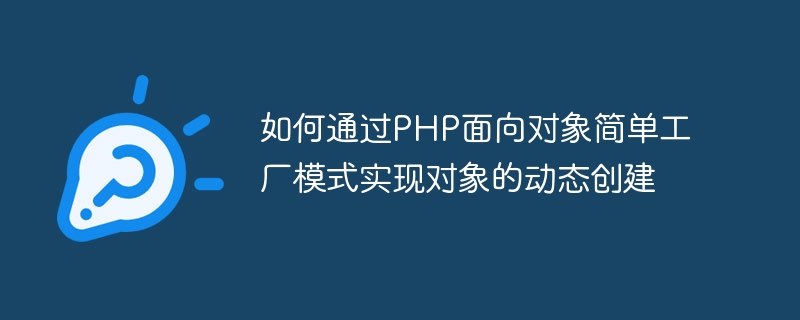Home >Backend Development >PHP Tutorial >How to achieve dynamic creation of objects through PHP object-oriented simple factory pattern
How to achieve dynamic creation of objects through PHP object-oriented simple factory pattern
- WBOYWBOYWBOYWBOYWBOYWBOYWBOYWBOYWBOYWBOYWBOYWBOYWBOriginal
- 2023-09-05 10:51:24692browse

How to achieve dynamic creation of objects through PHP object-oriented simple factory pattern
Simple Factory Pattern (Simple Factory Pattern) is a creational design pattern that provides A unified way to create objects. In PHP, we can implement the simple factory pattern through object-oriented programming to achieve dynamic creation of objects.
First, let us understand the basic principles of the simple factory pattern. In the simple factory pattern, there is a factory class (Factory Class) responsible for creating objects. This factory class usually contains a static method (static factory method) that determines which object to create based on the parameters passed in. In this way, we can create the required objects by calling the static methods of the factory class without directly instantiating the specific objects.
Below, take a product class (Product Class) as an example to demonstrate how to use the PHP object-oriented simple factory pattern to achieve dynamic creation of objects.
// 商品类
class Product
{
private $name;
private $price;
public function __construct($name, $price)
{
$this->name = $name;
$this->price = $price;
}
public function getName()
{
return $this->name;
}
public function getPrice()
{
return $this->price;
}
}
// 工厂类
class ProductFactory
{
public static function createProduct($type)
{
switch ($type) {
case 'book':
return new Product('Book', 29.99);
case 'phone':
return new Product('Phone', 499.99);
case 'laptop':
return new Product('Laptop', 999.99);
default:
throw new Exception('Unsupported product type: ' . $type);
}
}
}
// 使用工厂类创建商品对象
$book = ProductFactory::createProduct('book');
$phone = ProductFactory::createProduct('phone');
$laptop = ProductFactory::createProduct('laptop');
echo $book->getName(); // 输出:Book
echo $book->getPrice(); // 输出:29.99
echo $phone->getName(); // 输出:Phone
echo $phone->getPrice(); // 输出:499.99
echo $laptop->getName(); // 输出:Laptop
echo $laptop->getPrice(); // 输出:999.99In the above example, we created a Product class, which contains the name and price of the product. Then, we defined a ProductFactory class, which contains a static factory method createProduct, which determines which type of product object to create based on the parameters passed in. Finally, we use the factory class to create three different types of product objects and output their names and prices.
In this way, we can achieve dynamic creation of objects. When you need to create a new product type, you only need to add the corresponding branch to the factory class, and there is no need to modify other codes.
To summarize, through the PHP object-oriented simple factory model, we can achieve dynamic creation of objects, making the code more flexible and scalable. Using the simple factory pattern can achieve decoupling of objects, making our code clearer and easier to maintain. I hope that the introduction and sample code of this article can help everyone understand and master the use of the simple factory pattern.
The above is the detailed content of How to achieve dynamic creation of objects through PHP object-oriented simple factory pattern. For more information, please follow other related articles on the PHP Chinese website!

